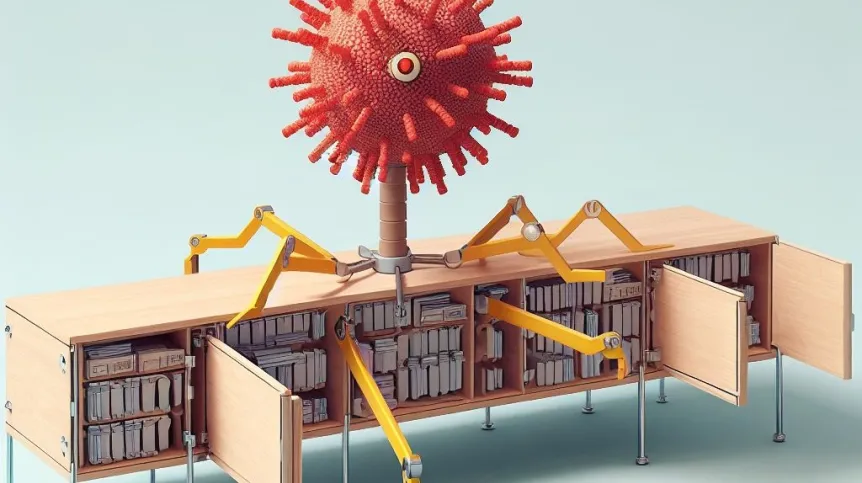
Will it soon be possible to easily adjust viruses to infect specific drug-resistant bacteria? It is quite possible. Recent discoveries of scientists from the Jagiellonian University Małopolska Centre of Biotechnology show why viruses are extremely genetically malleable. And just like with assembling modular furniture, attacking new strains of bacteria may only require replacing the old module with a new one.
Research by Dr. Rafał Mostowy's team was published in Nature Communications.
Bacteria also have their own infectious diseases - more precisely, viral infections. Bacteriophages, as they are called, infect the cells of bacteria, often leading to their death. Interestingly, these 'bacteria killer' viruses are a huge opportunity for humanity. Drug resistance has been a huge challenge for several decades.
Strains of bacteria resistant to many or even all known antibiotics are becoming an increasingly pressing problem both inside and outside of hospitals. According to the estimates, if the current trend continues, in 30 years the number of deaths caused by drug resistant bacteria could become as high as 10 million. Unable to keep up with the production of new antibiotics, humanity has been searching for alternative solutions for many years. One of them is bacteriophages.
Are we able to successfully employ bacteriophages in medicine? Science has both good news and bad news.
The bad news is that bacteria and bacteriophages have been locked in an evolutionary arms race for billions of years, since long before the first animal cells appeared on Earth. Billions of years of experience allowed bacteria to develop an immune system that is quite capable of defending them from bacteriophages.
The good news, however, is that bacteriophages are still able to quickly adapt and overcome the immune system of bacteria. The problem is that we still do not know how exactly. 'To unlock the therapeutic potential of bacteriophages, we need to better understand the ways in which they are able to successfully adjust to rapidly evolving bacterial cells,’ say the scientists.
The research has led to surprising conclusions: bacteriophages are incredibly malleable when it comes to genetics.
Each living organism contains genetic material (genome) that consists of many genes. Genes encode information about various characteristics, such as skin or eye colour in people.
The scientists used the latest bioinformatics tools to precisely compare hundreds of thousands of bacteriophage genes. After analysing the data, they saw something surprising: many different genes shared the same fragments.
'Our research revealed that bacteriophage genes are frequently composed on separate fragments, capable of undergoing independent evolutionary processes and forming diverse combinations. This situation can also be compared to a card game, in which instead of a standard set of 52 cards we have at our disposal their fragments that can be shuffled into hundreds of unique combinations, creating completely new types of cards. This results in some genes having a much higher genetic +plasticity+ and therefore being able to keep up with rapidly evolving bacteria,’ says lead researcher Dr. Rafał Mostowy from the JU Małopolska Centre of Biotechnology.
Research indicates that the most malleable bacteriophage genes are the ones that encode special proteins whose purpose is to fight bacteria. These proteins are crucial for the development of new methods of treatment using bacteriophages to fight bacterial infections.
Examples of such proteins include phage tails, specialised nano-machines capable of recognising particular bacterial strains, or endolysins, which destroy some bacterial cells by destroying a certain type of cell walls. These discoveries offer new possibilities in designing new antibacterial methods of treatment that target harmful bacteria and protect the beneficial ones.
Accordinf to the scientist, the results of the study also put our understanding of evolution in a new light.
'Up until now, it was believed that genes are the fundamental units of heredity and the evolutionary process. Our research adds another layer of complexity in this area, showing that sometimes not genes, but even just their fragments can be perceived as the most basic evolutionary units,’ says Dr. Bogna Smug from the JU Małopolska Centre of Biotechnology, the first author of the publication.
The study could also be used in the development of new antibacterial methods of treatment.
'Bacteriophages are very choosy and only infect certain strains of bacteria. Therefore, finding a right match is a tremendous challenge when it comes to designing treatments against drug resistant bacteria. Our research could be a watershed moment for this task. It’s like comparing ancient furniture with modern modular items that can be bought in stores today. In the case of the latter, we can change their functions and purpose in the blink of an eye, while obsolete or damaged modules can be easily replaced. In the same way, antibacterial treatments could be based on rearranging gene fragments to fight a specific drug resistant strain,’ says Dr Smug.
The research project was co-financed by NAWA, NCN and EMBO.
PAP - Science in Poland
lt/ agt/ kap/
tr. RL













